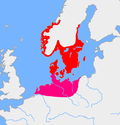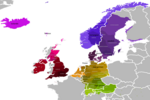West Germanic gemination was a sound change that took place in all West Germanic languages around the 3rd or 4th century AD. It affected consonants directly... 7 KB (641 words) - 13:08, 7 April 2024 |
released before the articulation of the second /t/. Syntactic gemination West Germanic gemination Glottal stop Length (phonetics) Vowel length Syllabic consonant... 46 KB (4,582 words) - 12:05, 17 April 2024 |
causes umlaut in the present where possible. In West Germanic, it also causes the West Germanic gemination. The forms of class 7 were very different and... 125 KB (12,200 words) - 18:20, 7 April 2024 |
disappeared in most verbs in old Germanic languages other than Gothic and Old Saxon. (It also resulted in West Germanic gemination in some verbs, and palatalization... 29 KB (2,932 words) - 16:56, 19 April 2024 |
West Germanic gemination Germanic languages Germanic substrate hypothesis This disambiguation page lists articles associated with the title Germanic sound... 922 bytes (121 words) - 23:29, 24 November 2022 |
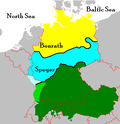 | High German consonant shift (redirect from High Germanic) consonant differences have an unrelated origin, being a result of the West Germanic gemination and a subsequent process of levelling. This shift also is only... 60 KB (6,422 words) - 12:28, 15 April 2024 |
vowel in languages other than Gothic. The -j- caused West Germanic gemination in the West Germanic languages in short-stem verbs ending in a consonant... 60 KB (5,117 words) - 07:44, 14 March 2024 |
 | century), and by the j-consonant gemination (attested from ca. 400 BCE); early inscriptions from the West Germanic areas found on altars where votive... 163 KB (20,172 words) - 13:40, 20 April 2024 |
Old English (category North Sea Germanic) English is one of the West Germanic languages, and its closest relatives are Old Frisian and Old Saxon. Like other old Germanic languages, it is very... 90 KB (8,308 words) - 12:43, 16 April 2024 |
Phonological history of English (category Articles with text in West Germanic languages) deer Intervocalic ðw > ww. Hardening: ð > d, β > v, and ɸ > f. West Germanic gemination: single consonants followed by /j/ except /r/ became double (geminate)... 75 KB (8,221 words) - 13:10, 7 April 2024 |
Sievers's law (section Sievers's law in Germanic) The West Germanic languages such as English largely lost the alternation because of the effects of the West Germanic gemination, but the gemination itself... 21 KB (2,862 words) - 15:07, 12 February 2024 |
Phonological history of Old English (category Articles with text in West Germanic languages) Note that in Proto-Germanic, the non-Sievers'-law variant -j- occurred only after short syllables, but due to West Germanic gemination, a consonant directly... 83 KB (8,846 words) - 00:19, 8 March 2024 |
tense. This suffix caused doubling of the preceding consonant (the West Germanic gemination) and changed the preceding vowel from e to i. The verb eten is... 41 KB (4,392 words) - 15:25, 11 April 2024 |
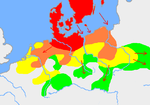 | Gothic language (category East Germanic languages) vakna; and the absence of gemination before j, or (in the case of old Norse) only g geminated before j, e.g. Proto-Germanic *kunją > Gothic kuni (kin)... 92 KB (9,687 words) - 23:28, 14 April 2024 |
 | Old High German (redirect from Old High Germanic) supra-regional form of German, Old High German encompasses the numerous West Germanic dialects that had undergone the set of consonantal changes called the... 43 KB (4,411 words) - 01:12, 18 April 2024 |
Old Saxon phonology (category Germanic phonologies) phonology will recognize some typical West-Germanic phonological features also found in Old English, such as gemination and the different pronunciations of... 15 KB (1,640 words) - 04:33, 24 August 2022 |
law presumably lost relevance in the West Germanic languages after the operation of the West Germanic gemination since it eliminated the contrast between... 5 KB (701 words) - 16:07, 30 October 2022 |
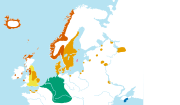 | Old Norse (redirect from Old West Norse) Norse, Old Nordic, or Old Scandinavian is a stage of development of North Germanic dialects before their final divergence into separate Nordic languages.... 112 KB (8,802 words) - 17:08, 2 April 2024 |
Non-affricated reflexes of /kj/ are found in some borrowings into West Germanic, for instance the Old High German echol and Old Saxon ekil 'steel' <... 102 KB (10,956 words) - 12:58, 18 April 2024 |
 | Vowel Shift, which began during the later Middle English period. Loss of gemination (double consonants came to be pronounced as single ones) Loss of weak... 61 KB (5,406 words) - 12:00, 13 April 2024 |
Latin. As an ancient Germanic language, the morphological system of Old Saxon is similar to that of the hypothetical Proto-Germanic reconstruction, retaining... 36 KB (2,226 words) - 22:36, 21 November 2022 |
Northwest Semitic languages (redirect from North-west Semitic) *yi-nqaṭil-u 'he will be killed'. The D-stem (Hebrew piʕel) is marked by gemination of the second radical in all forms. It has a range of different meanings... 30 KB (2,954 words) - 15:23, 24 March 2024 |
Rhotacism (section Germanic languages) tsneachta /ə ˈt̪ɾʲæːxt̪ˠə/. All surviving Germanic languages, which are members of the North and West Germanic families, changed /z/ to /r/, implying a... 19 KB (1,885 words) - 03:45, 20 February 2024 |
Voiceless bilabial plosive (category Articles containing West Frisian-language text) 1017/S0025100312000278 Goblirsch, Kurt (2018), Gemination, Lenition, and Vowel Lengthening: On the History of Quantity in Germanic, Cambridge University Press, ISBN 978-1-107-03450-1... 24 KB (915 words) - 18:24, 28 March 2024 |
Voiced bilabial plosive (category Articles containing West Frisian-language text) 1017/S0025100312000278 Goblirsch, Kurt (2018), Gemination, Lenition, and Vowel Lengthening: On the History of Quantity in Germanic, Cambridge University Press, ISBN 978-1-107-03450-1... 19 KB (760 words) - 14:50, 29 March 2024 |
preserve the pharyngeal consonants /ħ/ and (less commonly) /ʕ/, preserve gemination, and pronounce /e/ in some places where non-Oriental speakers do not have... 30 KB (2,563 words) - 02:17, 11 April 2024 |
Holtzmann's law (category Articles containing Proto-Germanic-language text) law involves the gemination, or doubling, of PIE semivowels (glides) * -y- and * -w- in strong prosodic positions into Proto-Germanic *-jj- and *-ww-,... 7 KB (761 words) - 00:11, 15 January 2024 |


